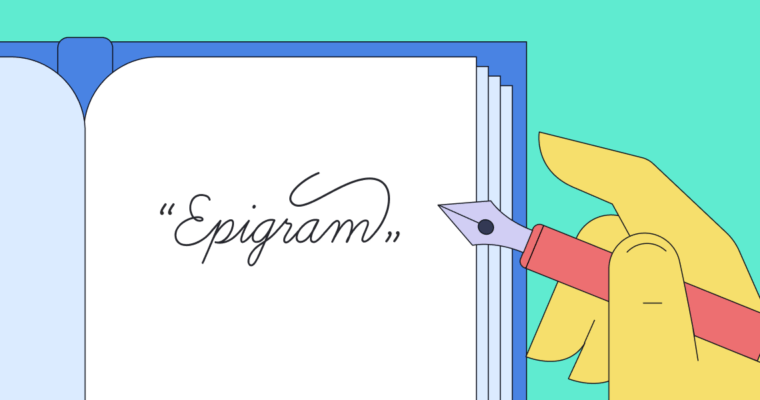
Certain figures in literature and history are known for their concise, witty phrases: Oscar Wilde, Mark Twain, Eleanor Roosevelt, and Martin Luther King, Jr., to name a few. These figures can distill big ideas into tight quips, making excellent sources for material in epigrams. An epigram is a short saying that expresses an idea in a memorable way.
What is an epigram?
An epigram is any short, catchy phrase or saying. Think Pinterest boards and coffee mugs—these are ideal vessels for epigrams. Epigrams can be serious, inspiring, or humorous. The most important thing is that they be memorable.
Epigrams often include a twist at the end, which adds humor or irony to the statement or turns it into satire. For example, this quote from Albert Einstein is a well-known epigram:
“The difference between genius and stupidity is that genius has its limits.”
The epigram is brief, clever, and a little snarky.
Epigrams can also convey more serious ideas. For example, politicians often use epigrams in their speeches to leave a lasting impression on their audience. Consider the following epigram, spoken by John F. Kennedy:
“Mankind must put an end to war, or war will put an end to mankind.”
The purpose of this epigram is to demonstrate the seriousness of the situation in a memorable way.
By expressing an idea in just a few remarkable words, a writer can use epigrams to catch a reader’s attention, convey a complex idea concisely, or create an opportunity for humor.
How are epigrams used?
The word epigram is derived from the Greek word epigramma, which means “to write upon” or “to inscribe.” Epigrams were originally used as markings on monuments and gravestones. They were pithy ways to summarize a life. Their use has expanded dramatically, and today you’ll find epigrams in poetry, political speech, and literature.
Early Greek poets were prolific in their use of epigrams. A tenth-century collection called The Greek Anthology includes more than 1,500 epigrams on everyday life and love, including (often satirical) lyrics about wine, women, Christianity, and song.
Since epigrams are written to catch an audience’s attention, this makes them a useful rhetorical device in speeches, especially those where a politician needs to win the respect and loyalty of an audience quickly.
Epigrams are also a powerful tool in literature, allowing writers to convey complex ideas and emotions in a concise way. You’ll often encounter epigrams at the beginning of a book as an epigraph.
Epigram vs. epigraph
Epigrams and epigraphs are derived from similar Greek words, and both originated as inscriptions. Because of this, they share certain characteristics, like being short and summarization. However, these two literary devices differ slightly.
An epigram is a short, witty saying or poem that expresses an idea. An epigraph is a quotation or excerpt that is included at the beginning of a book. The purpose of an epigram is to quickly get across a clever sentiment. The purpose of an epigraph is to set the tone or theme of a work and to provide a context for the reader. Sometimes epigrams make great epigraphs!
Epigram examples
“I can resist everything except temptation.” —Oscar Wilde
“Nobody’s free until everybody’s free.” —Fanny Lou Hamer
“Brevity is the soul of wit.” —William Shakespeare
“A witty saying proves nothing.” —Voltaire
“If you are not a myth, whose reality are you? If you are not a reality, whose myth are you?” —Sun Ra (quoted as an epigraph in A Little Devil in America, by Hanif Abdurraqib)
“It is love of peace that makes you a warrior.” —Louise Erdrich
“In Zen they say: If something is boring after two minutes, try it for four. If still boring, then eight. Then sixteen. Then thirty-two. Eventually one discovers that it is not boring at all.” —John Cage
Epigram FAQs
What is an epigram?
An epigram is a short, and often witty, phrase that conveys a message in a memorable way.
What is the purpose of epigrams?
Epigrams are written to create a lasting impression quickly. They show up often in poetry and political speeches because they distill big ideas into a few memorable words.
What is the difference between an epigram and an epigraph?
An epigram is a short, clever phrase. An epigraph is a quotation at the beginning of a book. Epigrams can be used as epigraphs if they are relevant to the book’s tones or themes.






